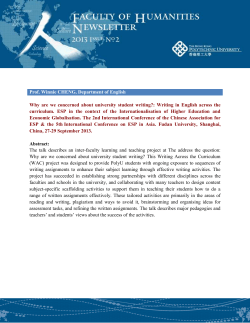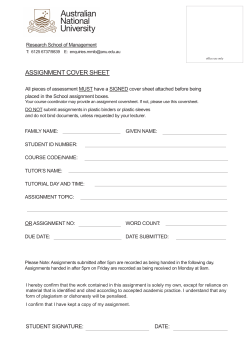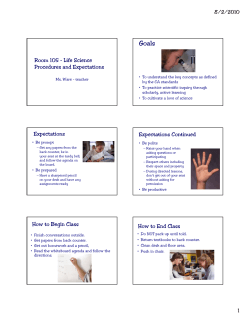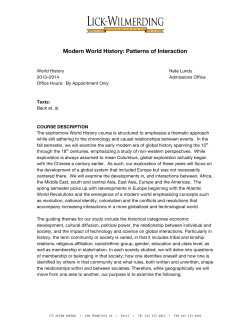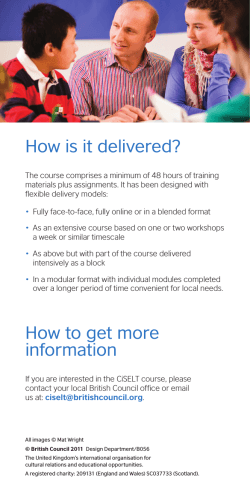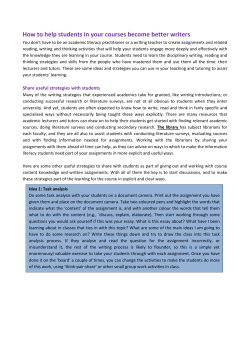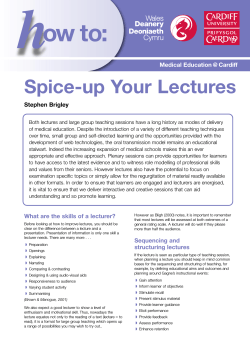
How to Excel in Phase 1 ! www.medsoc.org.au
! THE UNIVERSITY OF NEW SOUTH WALES MEDICAL SOCIETY How to Excel in Phase 1 ! ! www.medsoc.org.au Disclaimer!! • We are only students! • Perspectives, Predictions and Pointers given during this event are not endorsed by the UNSW Faculty of Medicine! • But you should listen to us anyway… ! What will be Covered! • End of Course Exams ! • Assignments and Projects! • Practical Exams! • OSCE/End of Phase/Portfolio (mainly for second years)! • General approaches to study and the best/most useful resources. ! ! ! What was the biggest factor motivating you to study? ! ! THE UNIVERSITY OF NEW SOUTH WALES MEDICAL SOCIETY Assignment Tips! Overview! • Assignment:! • Individual! • Group Projects! Graduate capabilities! • Using basic and clinical science! • Social and cultural aspects of health and disease! • Patient assessment and management! • Effective communication! • 7 courses (minus foundation) – each course you have to do one individual assignment and one group project. ! • Compulsory individual assignment! • Communication assignment! • Negotiated assignment! • Grading! • P+ (Distinction), P (Pass), P- (Borderline Pass), F (Fail)! • Teamwork! • Self-directed learning and critical evaluation! • Ethics and Legal Responsibility! ! • Reflective practitioner Assignment: Individual! • Each course will offer topics that address different capabilities. !! • MUST remember to pick assignments carefully as you have fulfil each graduate capability.! • Marking criteria! • Focus capability (2 graduate capabilities)! • Generic capabilities! • Effective communication! • Self directed learning and critical evaluation! • Development as a reflective practitioner! • Compulsory – negotiated and communication assignment! • Length: 1500-2000 words ! Assignments: Group Project! • Projects are not that strict – can overlap graduate capabilities – but I would suggest to spread them out as well (looks good for portfolio)! • Same marking criteria as individual assignments (with the exception of the generic teamwork capability)! • Length – 2000-2500 ! Assignments: How to pick them! A Good Strategy! Helps you to keep track of what graduate capabilities you have fulfilled and what score you received ! Assignments: Communication Assignment! • Interview an individual ! • Patient-centered! • Allow them to tell their story ! • Not a medical interview! • Show ability to understand and listen to the individual’s perspective and how the condition has impacted them.! • Show ability to empathize ! • Quota- only a certain number of students can do it per course. So REGISTER EARLY! • Focus Capabilities! • Effective communication! • Reflective practitioner! • Suggestion! • Do communication assignment either end of 1st year or beginning of 2nd year! Assignments: Negotiated Assignment! • http://medprogram.med.unsw.edu.au/negotiating-assignment - this website is your friend! • Focus capability! • Self- Directed Learning and critical evaluation! • Pick your own focus capability! • Remember to pick a topic that is relevant to your course theme ! • But not too close to topics taught in lectures ! • Write your proposal (set of 8 questions)! • Come up with your criteria ! • Submit and wait for your approval (remember they can disapprove your proposal if they think its too complicated or that you won’t finish on time)! Assignments: Negotiated Assignment! • Proposal:! • What is the proposed topic/question of the assignment?! • What incident or experience suggested this assignment to you? ! • What is the aim of the assignment, what do you expect to learn from doing it?! • Which capability does the assignment focus on?! • What do you propose to do in order to investigate this topic/question?! • What will be the length and format of the report that will be produced?! • What assessment criteria do you propose for the focus capability you have chosen?! • Set out a schedule showing intermediate milestones for weeks 2 to 6.! Assignments: Approach! • • • Research phase! Drafting and writing phase! Reflection! *** Please refer to the slides at the end of the presentation for further information ! ! THE UNIVERSITY OF NEW SOUTH WALES MEDICAL SOCIETY End of Courses and Practical examination tips! End of Course Exams (EOC)! • 1 per Teaching Period (7 weeks of class, 8th week is exam week)! • Average of 7 EOC Marks = “WAM” 50 for Pass.! • Foundations does not count ! EOC: Format and Content (BL)! • Content:! - Lecture Material, SG Material, Tutorial Material (no pracs or CCS)! • Format:! - 40 MCQs, 60 SA marks, 3 LA questions ! EOC: How to Study! • Try and make lectures! • Find what works for you!! – Study groups! – Mnemonics ! • Look at recommended textbooks! • Work throughout the course vs cramming! • Study notes! • Focus on high yield subjects! – Topics from scenarios! – Topics for short answer questions! • Physiology, Pathology, Anatomy vs Ethics! – Memorise important lists in lectures ! EOC: Exam Tips! • Who wrote this question?! • Use headings, same as lecture if possible! – Don’t worry about writing style!! • Talk around the topic! • Time management! • Subjects! – Histology, pharmacological = use tables! – Anatomy , pathology = reproduce diagrams ! EOC: Example Question! • Myocardial infarction (heart attack) usually affects the right side of the heart, do you agree?! • Really means…! – What is myocardial infarction?! – How does myocardial infarction occur?! – What is the arterial supply of the heart?! – Where do blockages in the arteries usually occur and which areas of the heart do they affect? ! Practical Exam! • General tips! – Easier than EOCs! – Write down everything the demonstrator says! – Use other people’s prac notes! – Revise lecture notes beforehand! • Anatomy! – Prepare beforehand!! – Use prac notes like a checklist! – Do the spot quiz! – Anatomy videos, library resources like Acland’s ! Histology and Pathology ! • • • • • Screen clippings of slides and annotation! Practice (simple!) sketching and labelling, functions! Recognise zoomed out versions of slides! Listen to PDP’s hints!! High yield: some questions (word for word) from adaptive tutorials! • E.g. Describe six features in the slide which confirm diagnosis, explain the clinico-pathological correlation of features, explain how would someone die from this condition ! Getting the most out of Lectures ! • • • • • • Try and make it to all lectures, annotate slides.! Pre-reading and post-reading! Look at recommended textbooks! Work throughout the course vs cramming! ? Study notes! ? Study groups ! Portfolio! • • • • • It’s a big reflection! Make sure you have covered all your graduate capabilities! Everything needs evidence! Can use non-course related material ! Previously —> Currently —> Future ! OSCE Tips! ! THE UNIVERSITY OF NEW SOUTH WALES MEDICAL SOCIETY OSCEs! • Limited clinical exposure in phase 1! • Find an older student buddy! • Confidence is key: “fake it till you make it”! • Not expected to detect abnormality! • Ask for general observations and vital signs! • Practice a “script/structure” for all your examinations and hx’s, and practice on non-meddies;! • Learn how to report a normal exam (have a template)! • Don’t hurt the patient and don't be a robot! • Breathe!!!! ! General Tips! THE UNIVERSITY OF NEW SOUTH WALES MEDICAL SOCIETY • Study 1-2 hours a day (develop an addiction for it)! • Pre-reading/Pre-work! • Talley and O’Connor is your bible! • Time management! • Get involved! • Avoid all nighters! • Study groups/buddies! • Always aim to improve (don’t get complacent) ! Take Home Messages! • Work steadily through the year! • Keep reading until you understand ! • Have a life and have fun! ! All! the best! All the Best! ! For questions, feel free to contact us:! ! [email protected]! ! THE UNIVERSITY OF NEW SOUTH WALES MEDICAL SOCIETY Extra Assignment Information! Research Phase! • Assignment criteria – read it!! • Recommended readings and Google/Wiki are a good starting point, but only use them as a segue into articles! • Search literature carefully, narrow your search by limiting to ‘review’, including more search terms, etc! • Be prepared to access unconventional sources e.g. government publications ! • Don’t jump into writing, spend 1-2 weeks reading widely! • Take notes from your readings and slot them into a skeleton! • Talk over the assignment with a friend?! Drafting Phase! • Start really early – you can even start the week before term begins – check emed under ‘map’ à ‘assessement’, write your negotiated assignment proposal or find a patient for comms and make a practice tape! • Start writing once you have your skeleton organised. Reference as you go!! This saves a lot of headache.! • Don’t take all the information in articles as gospel. Learn to be critical and comment on the quality of the study design, bias, etc. This will get you P+’s in SDL!! • Structure the report well, include subheadings, page numbers, title page, contents ! • Include diagrams and pictures, with captions! • Do not limit yourself while you write but be mindful of the word limit – short and sweet! ! • Have a friend who has no idea about the topic to proof read your work – helps to gauge how well you have explained technical concepts. ! • Good reference list! Reflection Phase ! • Be honest and open and use it as a genuine opportunity for self-improvement! • Avoid generalisations, clichés and non-specific waffle. Be very specific and give examples. ! • Don’t just retell, delve deeper and explore related issues! • Discuss:! – strengths and weaknesses! – improvements you made in this project! – how you will improve in the next one! – clinical relevance of the topic! – how it has helped your broader learning journey! – any personal opinions or relations to the topic! – things you found interesting or noteworthy! • Use the what? So what? Now what? approach! • ‘I feel I improved from my last assignment with time management’ is poor reflection. What were some of the factors that led you to manage your time poorly last time? What wisdom did you draw from these mistakes? How did you improve in time management? How will you continue to ensure you manage your time well? !
© Copyright 2026
